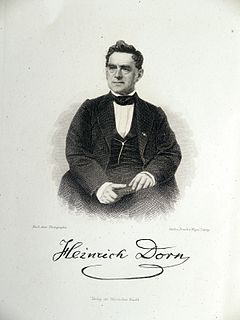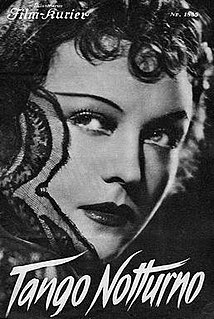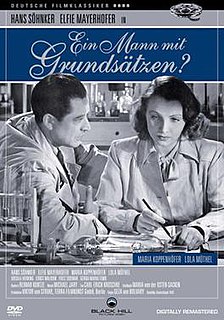
Johann Ludwig Bach was a composer and violinist.

Claire Waldoff, born Clara Wortmann, was a German singer. She was a famous kabarett singer and entertainer in Berlin during the 1910s and 1920s, chiefly known for performing ironic songs in the Berlinish dialect and with lesbian undertones and themes.
Imanuel Geiss was a German historian.

Hans Sommer was a German composer and mathematician.

Heinrich Ludwig Egmont Dorn was a German conductor, composer, teacher, and journalist. He was born in Königsberg, where he studied piano, singing, and composition. Later, he studied in Berlin with Ludwig Berger, Bernhard Klein, and Carl Friedrich Zelter. His first opera, Rolands Knappen, was produced in 1826, and was a success. Around this time, he became co-editor of the Berliner allgemeine Muzikzeitung.

Ernst Weyden was a scholar and member of the Faculty at the University of Cologne.

Friedrich Ludwig von Payer was a German lawyer, liberal politician and vice-chancellor of Germany during the last year of World War I. He was born in Tübingen and was educated at the seminary at Blaubeuren, returning to his home town to study law in 1865. Having completed his university education, he worked as a lawyer in Stuttgart and was first elected to the Reichstag in 1877. He reached the height of his political career during the First World War, during which he advocated a negotiated peace with the allied powers and was appointed vice-chancellor. After the War, he was chairman of the DDP, and remained a member of the new Weimar Reichstag until 6 June 1920. Payer married Alwine Schöninger.

"Prinz Eugen, der edle Ritter" is an Austrian-German folksong about the victory of Prince Eugene of Savoy in 1717 during the Austro-Turkish War of 1716–1718.

Tango Notturno is a 1937 German drama film directed by Fritz Kirchhoff and starring Pola Negri, Albrecht Schoenhals and Lina Carstens.

Johann Wilhelm Hill was a German pianist and composer.
Siegfried Obermeier was a German author of historical novels and popular history books. He was editor of The Secret Diaries of Ludwig II of Bavaria 1976. In 1978 he issued his first novel, initially under the penname Carl de Scott, a novelisation of the second life of Judas Iscariot. His Jesus in India book "Starb Jesus in Kaschmir?" made it to the Year Bestseller List of the Spiegel in 1983.
Melody of a Great City is a 1943 musical drama film directed by Wolfgang Liebeneiner and starring Hilde Krahl, Werner Hinz and Karl John. A young woman moves to Berlin to work as a press photographer.

A Man With Principles? is a 1943 German comedy film directed by Géza von Bolváry and starring Hans Söhnker, Elfie Mayerhofer and Sigrid Becker. A young female chemist moves to Hamburg for research where she encounters a handsome, but extremely sexist male colleague. Eventually she manages to conquer his affections and changes his attitude towards woman.
Rudi Schuricke was a popular German singer and film star. Especially well known in the 1930s through the early 1950s, his 1949 recording of "Capri-Fischer" was a "smash hit" in Germany. Even as late as the mid-1950s, he was still a successful musical artist. In 1954 alone, his song "Moulin Rouge" was the 74th most purchased single on the German year-end chart and another of his songs "Das Märchen unserer Liebe" appeared on the German Top50 chart. The advent of the rock 'n' roll age, however, soon made his music old fashioned.

Helmut Schlegel OFM is a German Franciscan, Catholic priest, meditation instructor, author, librettist and songwriter. He is known for new spiritual songs, set by various composers.

Laudato si' is an oratorio composed in 2016 by Peter Reulein on a libretto by Helmut Schlegel. Subtitled Ein franziskanisches Magnificat, it includes the full Latin text of the Magnificat, expanded by writings of Clare of Assisi, Francis of Assisi and Pope Francis. The composer set it for five soloists, children's choir, Choralschola, mixed choir, symphony orchestra and organ. It was published in 2016 by the Dehm Verlag, and was premiered on 6 November 2016 at the Limburg Cathedral, conducted by the composer.
Martin Böttger was a prominent civil rights activist in East Germany. He was a member of the Landtag of the Free State of Saxony from 1990 to 1994 and led the faction of Alliance '90/The Greens.

"Macht hoch die Tür" is a German popular Advent hymn, written in Ducal Prussia in the 17th century. The incipit is the first line, "Macht hoch die Tür, die Tor macht weit. The lyrics were written by Georg Weissel in 1623, for the inauguration of the Altroßgärter Kirche in Königsberg. The melody that is now associated with the text appeared first in 1704 in the hymnal by Johann Anastasius Freylinghausen.















